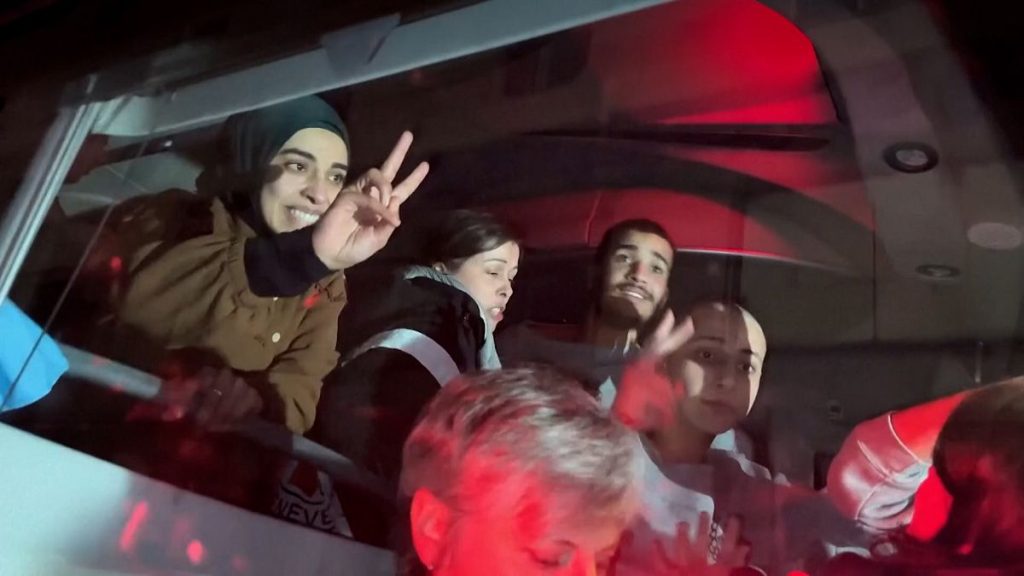The pre-dawn hours of Monday witnessed a scene of jubilant reunion and palpable relief in Beitunia, a city nestled in the heart of the West Bank. Thousands of Palestinians converged, their anticipation thick in the air, to welcome home 90 of their own, recently released from the confines of Ofer prison in Israel. These freed individuals represented a tangible symbol of hope amidst the ongoing, volatile ceasefire negotiations between Hamas and Israel, a fragile pact forged in the aftermath of a devastating conflict. The air crackled with celebration – fireworks painted the night sky, flags billowed in the breeze, and the resonant chant of “God is great” echoed through the streets, a collective expression of gratitude and defiance. As the former prisoners disembarked from the buses, they were met with an outpouring of emotion, hoisted onto shoulders and embraced by waiting families and friends, their release marking a poignant moment in the ongoing narrative of the Israeli-Palestinian conflict.
This prisoner release, a cautiously optimistic step towards a more enduring peace, is a direct consequence of the devastating events that unfolded on October 7, 2023. Hamas’s surprise attack on Israel, a day that etched itself into the collective memory with horrifying clarity, claimed the lives of 1,200 Israelis, plunging the region into a renewed cycle of violence. Israel’s subsequent response, a military operation of significant scale and intensity, resulted in the tragic loss of at least 46,000 Palestinian lives, further exacerbating the deep-seated animosity and mistrust that has long characterized the relationship between the two sides. The release of these 90 prisoners, then, represents a small but significant gesture, a glimmer of hope in the darkness, and a testament to the ongoing, albeit arduous, efforts to establish a ceasefire.
The scene in Beitunia, while undeniably a moment of joy and relief for the families directly impacted, is also a stark reminder of the human cost of the ongoing conflict. These released prisoners, having endured the hardships of incarceration, now return to a society grappling with the aftermath of immense loss and destruction. Their stories, undoubtedly marked by resilience and hardship, are woven into the larger tapestry of the Palestinian experience, a narrative of displacement, struggle, and an enduring hope for self-determination. The celebrations, while heartfelt, are tempered by the understanding that the road to lasting peace remains fraught with challenges and uncertainties.
The fragile ceasefire, secured through painstaking negotiations, hangs precariously in the balance. The release of these 90 prisoners is but the first step in a complex and delicate process. Another release is scheduled for Saturday, an event that will be closely scrutinized by both sides and the international community, serving as a barometer of the commitment to the ceasefire agreement. The success of these initial releases will undoubtedly influence the trajectory of future negotiations, setting the tone for the difficult conversations that lie ahead. The challenges are numerous and complex, encompassing not only the release of more prisoners but also addressing the underlying issues that fuel the conflict – land disputes, security concerns, and the fundamental question of Palestinian statehood.
The coming weeks will be crucial, a period of intense diplomacy and delicate maneuvering. The fragile truce remains vulnerable to disruption, susceptible to the ever-present threat of renewed violence. The path towards a lasting resolution requires unwavering commitment from both sides, a willingness to compromise, and a genuine desire to break free from the cycle of violence that has plagued the region for generations. The international community, too, plays a vital role, providing support and encouragement for the peace process, ensuring that the fragile gains achieved through the ceasefire are not lost.
The release of these 90 prisoners represents a flicker of hope, a fragile bridge across a chasm of mistrust. While the celebrations in Beitunia offer a glimpse of the potential for reconciliation, the true test lies in the sustained commitment to dialogue, compromise, and a shared vision for a future free from violence and oppression. The road to peace is arduous and uncertain, but the scenes of reunion and relief witnessed in Beitunia serve as a powerful reminder of the human stakes involved and the imperative to strive for a more just and peaceful future. The coming weeks and months will be critical, demanding patience, resilience, and a unwavering commitment to the pursuit of a lasting resolution to this enduring conflict.














